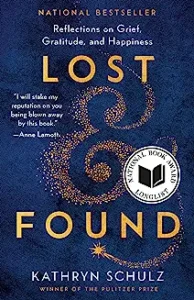Lost & Found by Kathryn Schulz 2022
This is an important book which I am still trying to process as I write this review. Schulz is a Puliltzer Prize winning staff writer for the New Yorker, and she was the guest editor in 2021 for my favorite series, ‘Best American Essays’. She writes beautifully and is among the best prose stylists writing these days. In this book, she writes with deep feeling, insight, and wisdom about the three words in the title, lost, found, and &. In addition to all of this wonderful writing, Schulz eruditely quotes some of my favorite poets: Bishop, Frost, Gluck, Whitman, and Szymborska in addition to Virginia Woolf and Montaigne. Heady company.
While the first two sections on Lost and Found are relatively straightforward, Lost being about the crushing death of her father at 72 and Found being about her falling in love with her future wife, the section on & was the one that I found most fascinating and meaningful. More on that later.
Lost focuses on her grief and mourning after her father died. Isaac Shulz had became a successful lawyer in suburban Cleveland after his family fled post-WWII Germany to live in the US. He was an intelligent, curious, funny, and loving father, deeply engaged with his two daughters. Her description of him made me yearn for my daughters to have the same feelings for me. Shulz moves from Isaac’s death (‘I lost my father’) to a brilliant study of what losing things means for us from losing one’s car keys to losing one’s mind. She cites one of my favorite poems, ‘One Art’ by Elizabeth Bishop to span this distance from the mundane to the earth-shaking and summarizes the impact of losing in this way, “In the end, this may be why certain losses are so shocking: not because they defy reality but because they reveal it.One of the many ways that loss instructs us is by correting our sense of scale, showing us the world as it really is: so enormous, complex, and mysterious that there is nothing too large to be lost—and conversely, no place too small for something to get lost there.” Her phrase ‘the relentlessness of disappearnces‘ is just about a perfect description of the current phase of my life.
In contrast, the section entitled ‘Found’ focuses on the pleasurable processes of recovery or discovery, either through intent or serenedipity, moving from the WWII submarine war Theory of Optmal Search to Meno’s Paradox to her future father-in-law’s discovery of a meteorite in rural Nebraska as a child. Again, her phrasing was superb as in her description of traveling with her partner, ‘the country in its endless interestingness unfurling there besides us.”
She summarizes these first two themes as follows: “Loss diminishes the world; finding makes it richer, more abundant, more interesting…..Loss may alter our sense of scale, reminding us that the world is overwhelmingly large while we are incredibly tiny. But finding does the same; the only difference is that it makes us marvel rather than despair.”
She then moves on to discuss ‘and’ in the form of the ampersand which she points out is the result of the combination of the Latin ‘et’ and ‘tu’, from ‘per se’ which in ancient Rome formed the final entry in the alphabet, following Z. This third most common word in English usage (after ‘the’ and the forms of ‘to be’) is the means by which we find connection and continuation, and Schulz explores human potentiality and it pertains to her through her discussion of this tiny word. She writes, “This abundance is one of the most wonderful things about life, and also one of the most difficult, because it throws into relief the constraints of our own existence…The world overflows with possibilities but only a tiny fraction of them are available to each of us.” And then she pivots to the central theme of this book, the finiteness of life, the inevitability of death and loss. She writes: “This is the essential difficulty of our situation: Life goes on but we do not.”
I could write much more about this fascinating and thought-provoking book, but that line seems like a good place to stop. This is one of those rare books which when I closed it, I wanted to reopen it and read it again. I hope you feel the same way if you read it.



